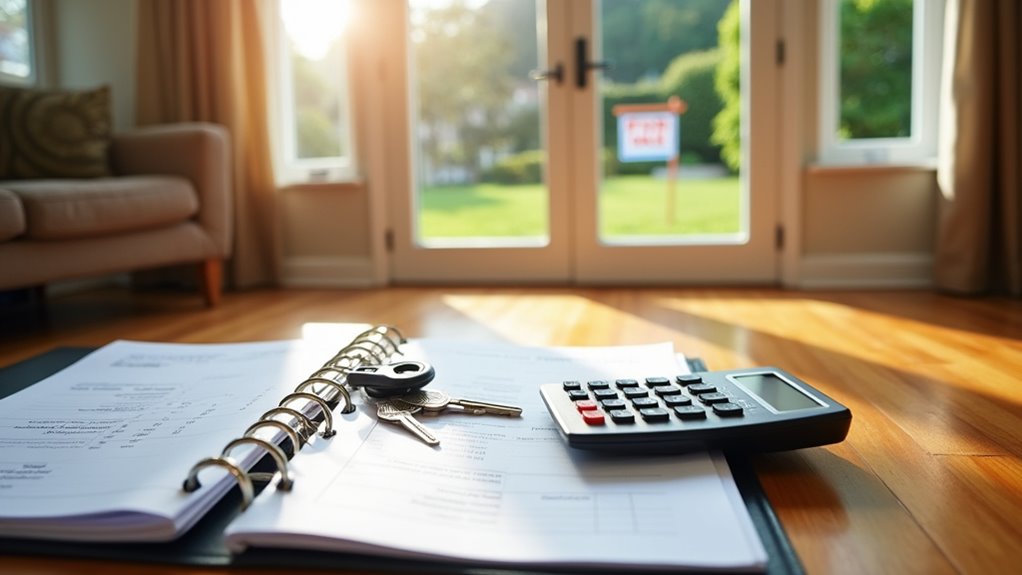Selling a rental property might seem like a good way to make a profit. However, capital gains taxes can take away a big portion of your earnings. Many owners are surprised by how much they owe after the sale.
These taxes can cut your profits by thousands of dollars. You may also face extra taxes from depreciation recapture, which can be up to 25%. Not knowing the rules can leave you with less money than expected.
Capital gains taxes lower the amount you keep when selling rental property, but smart planning can help you save money. You should understand the different tax rates and how improvements or time owned affect your final bill.
Careful planning is the best way to protect your profit. This blog will guide you through the process and help you get the most from your rental property sale.
Key Takeaways
- Capital gains taxes are owed on the profit from selling a rental property, calculated as the sale price minus adjusted cost basis.
- Depreciation claimed during ownership lowers your basis, increasing taxable gain, with recaptured depreciation taxed up to 25%.
- Long-term capital gains rates (0%, 15%, or 20%) apply if the property was owned over a year; otherwise, ordinary income rates apply.
- Rental properties do not qualify for the primary residence exclusion, but a 1031 exchange can defer capital gains tax by reinvesting in similar real estate.
- Accurate records of purchase price, improvements, and depreciation are essential to correctly calculate and minimize taxable capital gains.
Understanding Capital Gains Taxes

Capital gains taxes can reduce your profit when you sell a rental property. You pay tax on the difference between your sale price and your adjusted basis. The adjusted basis is your original purchase price, plus improvements, minus depreciation.
Accurate records of all costs and improvements will help you calculate your gain correctly. If you make mistakes or forget details, the IRS could investigate and charge more tax. Keeping clear records makes tax filing easier. If you sell your house fast without an agent, you may also save on transaction costs and further reduce your taxable profit.
Transaction costs, such as agent fees, lower your taxable profit. If you plan carefully, you can reduce your capital gains tax. Good tax planning helps you keep more of your investment returns.
If the property was ever your main home, you may be able to benefit from the primary residence exclusion and exclude some profit from capital gains taxes.
Short-Term vs. Long-Term Capital Gains
The IRS taxes short-term and long-term capital gains differently when you sell a rental property. If you sell after owning the property for one year or less, your gain is short-term and taxed as regular income. If you own the property for more than one year, your gain is long-term and taxed at a lower rate.
Short-term gains can be taxed up to 37% in 2024, depending on your income. Long-term capital gains rates usually range from 0% to 20%. Your specific rate depends on your total income. Working with trusted local home buyers can help you better understand your options for selling and how taxes may affect your final proceeds.
An accurate property appraisal is important for reporting your gain correctly. If you want to delay paying capital gains tax, you can consider a 1031 exchange. This lets you reinvest in another investment property while postponing your tax bill.
When selling your rental property, it’s important to note that selling as-is can impact both the sale price and the pool of potential buyers, especially if the property needs repairs.
Calculating Your Cost Basis

Calculating your cost basis is the first step in figuring out your capital gains tax. Cost basis means the total amount you invested in your property. A correct cost basis helps you pay only the tax you owe. Your cost basis is the key figure for capital gains tax, ensuring you only pay tax on your true profit.
Cost basis includes more than the purchase price. You should add fees like title charges, legal costs, and transfer taxes. If you made major upgrades, include those as well. For sellers in Florissant, you may also need to factor in selling to cash home buyers when considering how your cost basis and final net proceeds are affected.
Selling costs such as commissions and closing fees also count. Some local improvement charges may be added if they benefit your property. If you miss any of these, you could pay more tax than necessary.
Check each item carefully to make sure your total is right. If you are unsure, consider getting professional advice. Proper calculation can help lower your tax bill.
If you want to avoid extra costs, remember that selling your house as-is without extra expenses can also help you maximize your return.
Depreciation Recapture Rules
Depreciation recapture is a tax rule for rental property owners. You must pay tax on the depreciation you claimed while owning the property. The IRS taxes this amount at a maximum rate of 25%.
Depreciation lowers your cost basis, so you may owe more tax when you sell. If your total income is lower in the year you sell, you might pay less tax on the recaptured amount. You should check how depreciation recapture and capital gains tax will affect your sale. If your property contains asbestos materials, you may also need to consider disclosure laws and possible remediation costs as part of your overall tax and sale planning.
If you plan your sale carefully, you could keep more money after taxes. You may want to sell in a year when your income is lower. Future tax law changes could also affect your tax bill, so stay informed. If you are selling a property that is still under a land contract, you should review the contract terms and consult a real estate lawyer to ensure you comply with all legal requirements.
Impact of Improvements and Renovations

When you invest in substantial improvements or renovations, you increase your property’s cost basis, which can directly reduce your capital gains tax liability upon sale. It’s critical to distinguish between capital improvements—eligible for cost basis adjustment—and routine repairs, which aren’t. By strategically tracking eligible renovation expenses, you optimize tax efficiency and amplify after-tax returns.
Working with a trusted cash home buyer ensures you can sell your property without the stress of making additional costly upgrades or dealing with complicated escrow paperwork. If you choose to sell houses as-is to a local buyer, you can still benefit from the cost basis increase from prior improvements without taking on the hassle or expense of new upgrades.
Increasing Property Cost Basis
A property’s cost basis is the starting point for figuring out capital gains when you sell. Making improvements or renovations can raise your property’s cost basis. A higher cost basis means you may pay less in capital gains tax when you sell.
You should only add capital improvements to your cost basis, not regular repairs. Always keep receipts and contracts for any qualifying upgrades. The IRS may ask for proof if you claim these adjustments.
Track each improvement in a detailed record or ledger. If you plan to sell, review how these changes affect your property’s value. Consider adding cost basis adjustments to your yearly tax planning to avoid surprises.
If you are unsure about what counts as a capital improvement, check IRS guidelines or talk to a tax professional. Proper documentation is key for every step. This careful approach can help you save money when you eventually sell the property.
Eligible Renovation Expense Deductions
Capital improvements increase your property’s cost basis. You cannot deduct these costs right away. Instead, you add them to your cost basis, which may lower your taxable gain when you sell.
Common capital improvements include new roofs, kitchen remodels, and HVAC upgrades. These are not the same as repairs. Repairs can be deducted in the year they are done, but improvements cannot.
You should keep records of all expenses. Receipts and contractor invoices will help prove your claims to the IRS. If you track these costs well, you can reduce your taxes when you sell.
If you want to maximize your deductions, always separate repairs from improvements. Proper records can also help you plan for depreciation. This approach supports your long-term financial goals for your rental property.
Determining Your Adjusted Basis
Your adjusted basis is the amount you use to figure your gain or loss from selling a rental property. It begins with your original purchase price and changes with certain costs or deductions. If you track these numbers, you can understand your tax responsibility.
Adjusted basis starts with your purchase price and adjusts for costs or deductions, helping you determine your gain or loss when selling.
The adjusted basis increases if you pay for capital improvements, like a new roof or remodeled kitchen. It also goes up with acquisition costs, such as closing fees or legal expenses. If you add these, you must keep good records. Many sellers in St. Peters, MO benefit from understanding sell in any condition policies when calculating their adjusted basis.
Depreciation deductions and some property management costs can lower your adjusted basis. If you have claimed depreciation each year, subtract it from your total. Tenant screening fees and similar expenses may also affect your basis if they are not deducted elsewhere.
If you want to reduce your taxes when you sell, you must calculate your adjusted basis carefully. You should keep all receipts and records during ownership. These steps will help you get the most accurate tax result. It’s important to understand that capital gains taxes may apply when selling a rental property, and your adjusted basis will directly impact how much you owe.
Tax Rates for Different Income Levels

Federal tax rates on capital gains from selling rental property depend on your income. For 2024, rates are 0%, 15%, or 20%. Single filers pay 0% if income is up to $44,625, 15% up to $492,300, and 20% above that.
Married couples filing jointly have higher income limits for each tax rate. If your income is higher, you may pay more in taxes. Working with local investors who understand the unique West County market can also help sellers navigate the process efficiently and avoid unnecessary costs.
Rental property sales include special rules. Depreciation claimed on the property lowers your cost basis, increasing your taxable gain. If you have taken depreciation, the IRS may tax that portion at a maximum 25% rate, called depreciation recapture.
If you plan to sell, consider your income bracket and how much depreciation you have claimed. Proper planning can help lower the taxes you owe after selling a rental property. Local sellers can also benefit from fair cash offers that avoid real estate agent commissions and extra fees.
Primary Residence Exclusion vs. Rental Property
You’ll see a significant tax advantage if you qualify for the primary residence exclusion, which allows up to $250,000 ($500,000 for joint filers) of gain to be exempt if you meet ownership and use tests. Rental properties don’t benefit from this exclusion, so your capital gains exposure is much higher.
Analyzing these distinctions is crucial for optimizing your tax strategy when selling property. If you’re considering selling your rental property, you may want to explore selling as-is for cash to avoid repair costs and streamline the process.
Qualifying for Exclusion
The IRS allows you to exclude some capital gains when you sell your main home. Individuals can exclude up to $250,000, and married couples can exclude up to $500,000. This rule does not normally apply to rental properties.
You must own and live in the home for at least two of the five years before selling it. If you convert a rental property to your main home and meet these rules, you may qualify. Sometimes, you may get a partial exclusion if you do not meet the full time requirement.
Rental use can lower the amount you can exclude. Accurate records and documents are required to prove your eligibility. Careful tax planning can help you keep more of your profit.
Tax Implications Differences
The IRS gives tax breaks for selling your main home, but not for most rental properties. Rental property sales are taxed at long-term capital gains rates, usually 15% or 20% based on income. You cannot use the $250,000 ($500,000 for couples) exclusion unless you meet strict requirements.
If you have claimed depreciation on your rental, you must pay depreciation recapture tax of up to 25%. This increases your tax bill. Planning when to sell can help lower your taxes.
If you change a rental back to your main home, you might get a partial exclusion. The amount depends on how long you lived there. Always check your projected gains and tax bracket before selling.
Smart timing and knowing the rules can help you keep more profit after taxes. Consider all options if you want the best result when selling a rental property.
The Role of 1031 Like-Kind Exchanges

A 1031 like-kind exchange lets you defer paying capital gains taxes when you sell rental property. You must reinvest the sale money into another similar property. This IRS-approved method helps you grow your investment portfolio over time.
Defer capital gains taxes by reinvesting rental property sale proceeds into similar properties and watch your investment portfolio grow over time.
If you use a 1031 exchange, you keep your depreciation schedules intact. This means you can continue to claim tax deductions on your new property. Your cash flow may improve since you avoid immediate taxes.
Estate planning becomes easier with a 1031 exchange. You can combine properties or pass them to heirs with potential tax benefits. If your heirs inherit the property, they may receive a stepped-up basis, which could reduce future taxes.
A 1031 exchange also allows you to reallocate assets. If you want to change locations or types of properties, you can do so without paying capital gains taxes right away. This flexibility can help you meet long-term investment goals.
State vs. Federal Capital Gains Taxes
You need to account for both federal and state capital gains tax rates, as they can significantly impact your net proceeds from a rental property sale. The federal long-term capital gains rate ranges from 0% to 20% based on your taxable income, while state rates vary widely, with some states imposing no tax and others exceeding 13%. Analyzing these combined rates is essential for accurate after-tax return projections and strategic disposition planning.
Federal Tax Rate Differences
Federal and state capital gains taxes are not the same when you sell rental property. The federal tax depends on how long you owned the property and your income level. State taxes vary by location and often have different rates and rules.
The federal government taxes long-term gains at 0%, 15%, or 20%. If you owned the property for less than a year, gains are taxed at your regular income rate. Depreciation recapture is taxed at a federal rate of 25%.
Accurate property valuation is important for correct tax calculation. If you have made improvements or taken depreciation, these will affect your taxable gain. Always check both federal and state laws before selling your rental property.
State-Specific Tax Impacts
State taxes on capital gains from rental property vary by location. Some states, like Texas and Florida, have no state tax. Others, such as California, can tax gains at over 13%.
Each state sets its own tax rates and rules. You should check if your state allows any exclusions, deductions, or credits. If allowed, these can lower the tax you owe.
The taxable gain is the sale price minus the adjusted basis of your property. Accurate property value records are important for this calculation. If you do not plan carefully, you may owe more tax than expected.
Evaluating both federal and state taxes will help you keep more profit. This is especially true in states with high tax rates. If you review your options, you can better manage your tax bill.
Reporting the Sale to the IRS
The IRS requires you to report the sale of a rental property. You must calculate any capital gain or loss from the sale. This is done by using IRS Form 8949 and Schedule D.
You should collect your HUD-1 or closing disclosure for sale details. If you claimed depreciation, review your past depreciation schedules. These documents help you adjust the property’s basis correctly.
Accurate property valuation is important because mistakes can lead to audits or penalties. Always include all qualified expenses in your calculations. If you are unsure, consult a tax professional.
After completing Form 8949 and Schedule D, keep all supporting records. You should keep these documents for at least three years. If the IRS requests proof, these records will support your calculations.
Strategies to Minimize Capital Gains Taxes
You can significantly reduce your tax liability by leveraging a 1031 exchange, which allows you to defer capital gains taxes when you reinvest proceeds into qualifying properties. Data shows that holding your rental property for more than a year transitions gains from short-term to long-term rates, typically lowering your tax burden. Strategic use of these mechanisms can optimize your after-tax return on investment.
1031 Exchange Opportunities
A 1031 Exchange lets you delay paying capital gains taxes when you sell a rental property. You must reinvest the sale money into a similar property. This helps you keep more of your profits for future investments.
The IRS has strict rules and deadlines for these exchanges. If you want to use this option, you must understand these requirements. Careful planning is needed to make sure your exchange qualifies.
Property values and market timing affect your results. If you use current data, you can choose better replacement properties. Smart choices help you follow the rules and save on taxes.
Utilizing Long-Term Ownership
Owning rental property for more than a year qualifies your profit for long-term capital gains tax rates. These rates are lower than short-term rates, which are taxed as regular income. If you want to pay less tax, consider holding the property more than one year.
Landlords must care for the property and manage tenants during ownership. Good maintenance keeps the property valuable and attractive to buyers. If rentals are well-kept, they often increase in value over time.
You can combine long-term ownership with active management to lower your taxes. This strategy also helps you get better returns when you sell. If you plan ahead, you can both defer and reduce capital gains taxes.
Special Considerations for Inherited Properties
Inherited properties have special tax rules. The IRS uses a “stepped-up basis” to reset the property’s value to the date of death. This rule can lower the taxes you pay when you sell the property.
You must get an accurate fair market value for the property. Proper documentation is important for IRS records. If you rent out the property, depreciation recapture rules will still apply.
Good estate planning can help you save on taxes. If you consider these factors, you can get more value from an inherited property. Always keep clear records for easier tax reporting.
Planning Ahead for Your Next Investment
Before you buy your next rental property, check how much capital gains tax you might owe when you sell. Estimate future taxes using current IRS rules and possible property value increases. This helps you plan for any tax payments ahead of time.
Use past data and market trends to pick areas with good job growth and more people moving in. Always compare similar property sales and check likely rental income. Look at how much the property could grow in value over several years.
If you hold the property for different lengths of time, your capital gains tax will change. Include depreciation recapture when you calculate after-tax profits. Consider tax strategies like a 1031 exchange or tax-loss harvesting to delay or lower your taxes.
Conclusion
If you plan to sell your rental property, you should understand how capital gains taxes can reduce your profits. Careful planning and good record-keeping may help you keep more money after taxes. If you use strategies like a 1031 exchange, you could defer some tax payments.
If you want to avoid the hassle and uncertainty of the traditional selling process, you could consider selling for cash. We buy houses for cash, making the process faster and easier. This option may help you avoid extra costs and close quickly.
If you want to learn more or are ready to sell, we can help. Freedom Path Investors can offer you a fair cash offer for your property. Contact us today to see how we can help you achieve your investment goals.








